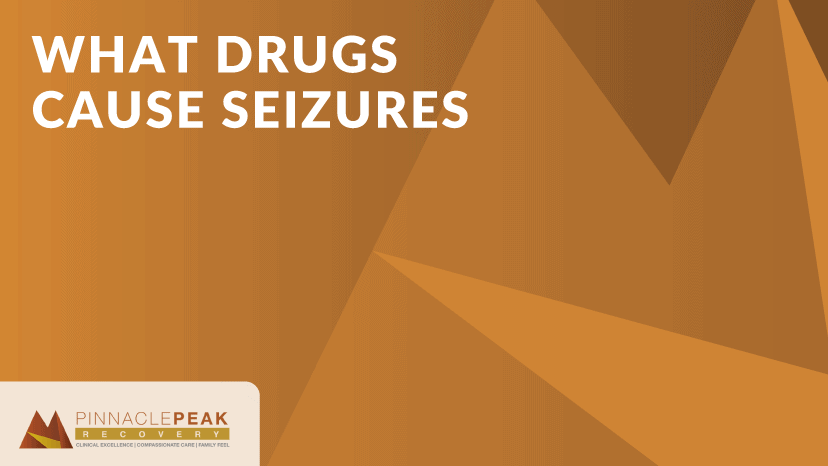Have you ever seen someone have a seizure before? Hearing about it versus experiencing it first hand, whether having one yourself or seeing someone you know have one, are two very different things. It can feel debilitating to not know what to do or how to help.
Over 3.4 million people in the United States have an active seizure disorder. It can change the way you interact with the world, needing to be more conscious of certain things when you feel a seizure is coming. Some might think it’s something you’re born with, but it can also develop over time, and certain things like substance use can influence it. What drugs cause seizures?
For those who regularly partake in things like benzodiazepines, opioids, or even alcohol, there is a risk of seizures that can occur. If you’ve experienced seizures before due to substance use, or for any other reason, it can also increase your risk of experiencing another one. Is there a way you can prevent this? How do drugs cause seizures in the first place?
Here at Pinnacle Peak Recovery, we see questions like this all the time. We strive to help answer these questions and further educate our community as a whole so they can make informed decisions about their health. Substance use impacts a wide spread of people. Today we’re going to look specifically at the relation between seizures and substance use.
The Most Common Causes of Drug-Induced Seizures
The most common cause for a drug-related seizure doesn’t usually come from the drug alone, but rather an overabundance or lack of it. This means that overdoses and withdrawals are the main reason for substance-related seizures.
In order to better explain why this is, let’s look at what causes a seizure in the first place.
What Happens During a Seizure?
A seizure is almost like your body’s response to a glitch or hiccup within the brain. Specifically, seizures tend to originate from small bursts of electrical signals that disrupt the normal flow of your brain. Everyone has the potential to experience a seizure, but certain things such as illness, substance use, and physical conditions can impact how often you might experience them.
While everyone's experiences will differ, some people are able to detect a seizure hours or even days before it actually happens. It’s normally described as “feeling off” while also having haywire senses, headaches, nausea, lightheadedness, or numbness in the body. These symptoms can carry on into the main portion of the seizure, sometimes amplifying when they do.
Not everyone who experiences seizures will have the same outward symptoms. Some people are also more aware than others when experiencing them.

The Relationship Between Seizures and Substance Use
If seizures are caused by things that happen within the brain – how does substance use play into that?
Substances often impact more of our bodies than we realize. For example, many people know that high alcohol consumption can negatively impact the liver, but did you know it can also impact your digestive system and heart, too? The same goes for other substances. While it’s easy to know the side effects it may cause, many substances impact the brain and its functions more than we think.
Because of this, they have a chance of causing a seizure. During most instances of substance use, when someone is casually participating, low levels of a substance are at an incredibly low risk for triggering a seizure in someone without a seizure disorder. The two extreme ends of that, however, can greatly increase the odds.
With an overdose, this occurs due to your brain being overwhelmed by the amount of a substance in your body. It can make your brain act up and misfire, triggering a seizure. Withdrawal is the opposite. Withdrawal occurs when your brain is used to a substance being there to help with things. Eventually, the body adjusts to it helping. If you suddenly pull it away, however, it then has to react to its absence. This reaction and the side effects from it are also a common source of a seizure.
How Substance Misuse Affects Seizures and Seizure Disorders
As mentioned earlier in the article, once a person has a seizure, they can be at greater risk of experiencing another. There is often a “seizure threshold” that is unique to each individual. It’s not a measurable thing, but rather a way to discuss what triggers seizures in different people.
For those who already are managing a seizure disorder, their threshold for triggering a seizure is likely lower than others. This means they’ll be at an even greater risk of experiencing a seizure from substance use. If they’re on medication for their seizures, like benzodiazepines, they can also experience negative interactions with other substances, especially alcohol. Their medication would also become less effective due to substance use, which could put them at a greater risk for seizures.
If you don’t have a diagnosed seizure disorder but you experience one or two from substance use, you could end up with diagnoses down the road. It’s not uncommon for life experiences or old age to cause people to develop a seizure disorder, and substance use is no different.
What Are the Most Common Drug-Induced Seizure Symptoms?
Since drug-induced seizures usually occur from overdose or withdrawal, let’s take a look at some of the common symptoms of these. While the seizure management reaction should be the same, it’s important to know if someone is overdosing or withdrawing. If you were there when you saw them take the substance, you can probably make an educated guess on what has occurred, but if you ever walk in on someone who is seizing it can be important to know the difference.
Some common overdose symptoms include:
- Slurred speech
- Pinpoint pupils
- Unresponsiveness
- Blue-tinted skin
- Confusion
- Lowered heart rate
- Unconsciousness
Some common withdrawal symptoms include:
- Changes in appetite
- Sudden changes in mood
- Agitation
- Cravings
- Restlessness or difficulty sleeping
- Hallucinations
- Difficulties with memory
Both of these conditions require medical assistance in their own way. While withdrawal can be addressed through a detox program and treatment, an overdose should be addressed through emergency medical assistance. If you think someone is going through an overdose, or you have any concerns regarding a seizure, don’t be afraid to seek out medical help. The Good Samaritan Law protects the right to seek medical help, even if it’s related to substance use.

Which Medications Can Lower Your Seizure Threshold?
While medication interacts with everyone differently, there are some medications that have been shown to potentially lower the seizure threshold. This shouldn’t be a concern for those who haven’t had a seizure before, or who don’t have a seizure disorder, but it can be important to know.
Some of these medications include antidepressants, antipsychotics, penicillin, and anesthetics. The exact effects of these medications can vary depending on many factors. If you have any questions or concerns about a medication you’re on, make sure you ask your doctor.
What to Do if Someone Is Experiencing a Seizure
If someone is experiencing a seizure, it’s important to know what steps you can take to help them.
First, if possible, help the person lie on the ground. Lying down ensures they don’t fall over and hurt themself.
If you have something small and soft nearby, use it to cushion their head. This could be something like a folded-up jacket or towel. Do not try to restrain or hold down the person, as this could injure them.
Move any objects nearby that could hurt them. Do your best to time the seizure, too. If it lasts longer than 5 minutes, or they have multiple seizures without much time to breathe between them, you should call for medical help.
When they wake up, be calm and give them time to come to. This can take minutes or longer at times. Feel free to grab water for them or a small snack, but don’t force it on them until they seem ready.
Need Help Recovering From Substance Use Disorder .
Give Us A Call Today!
If you or a loved one has had seizures due to substance use and you’re looking for a path to recovery, Pinnacle Peak Recovery is here to help. With our team of master’s level physicians, as well as a proven process for helping you reach your recovery goals, we’re ready whenever you are. Give us a call today at 866-377-4761 and we'll get you started.

